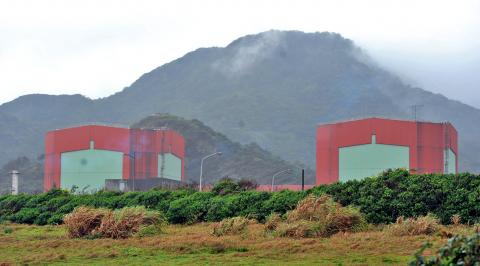Taiwan Power Co (Taipower, 台電) yesterday said that it is planning to start a rotational operation scheme at the Jinshan Nuclear Power Plant in New Taipei City’s Shimen District (石門) in November at the earliest in a bid to cope with the problem of decreasing storage space for nuclear waste.
“The plan is to operate the power plant from June to October and suspend operations during the rest of the year to decelerate the use of radioactive rods,” Taipower spokesman Hsiao Jin-yi (蕭金益) said by telephone.
Taipower will increase electricity generation at coal-fired and gas-powered plants when the Jinshan nuclear power plant is offline, Hsiao said.

Photo: Chang Chia-ming, Taipei Times
When asked whether increasing the use of higher-cost coal and natural-gas resources would cause a hike in electricity prices, Hsiao said the effect on the prices would be “limited.”
Taipower estimates that reducing power generation at the nuclear power plant from November to May would account for less than 3 percent of the total annual power generation, so it would not affect electricity prices too much, he said.
The plan comes as the four pools for spent fuel rods at the Jinshan plant and the Guosheng Nuclear Power Plant in New Taipei City’s Wanli District (萬里) approach their capacities, Hsiao said.
A single pool can store a maximum of 3,083 used radioactive rods and the two pools at the Jinshan plant have 3,074 and 3,076 used nuclear rods respectively, according to Taipower.
The No. 2 reactor at the Jinshan plant, which is operational, should have its more than 100 used nuclear rods replaced between next month and July next year, the company said.
As a new dry-storage facility for used rods in New Taipei City is pending local government approval, if Taipower does not come up with a solution, the Jinshan plant might have to cease operations next year due to a lack of storage space for nuclear waste, said a Taipower official who declined to be named.
That means the Jinshan plant would be retired ahead of the planned decommissioning of its No. 1 reactor in December 2018 and No. 2 reactor in July 2019.
Taipower had allocated a budget and made a public call for bids to transport used nuclear fuel rods abroad, but the proposal was suspended due to protests.
Hsiao said the scheme could slow down the generation of nuclear waste, extending the operation of the power plant for another two years.
Taipower would carry out the plan once the Ministry of Economic Affairs approves it, he said.

CHAOS: Iranians took to the streets playing celebratory music after reports of Khamenei’s death on Saturday, while mourners also gathered in Tehran yesterday Iranian Supreme Leader Ayatollah Ali Khamenei was killed in a major attack on Iran launched by Israel and the US, throwing the future of the Islamic republic into doubt and raising the risk of regional instability. Iranian state television and the state-run IRNA news agency announced the 86-year-old’s death early yesterday. US President Donald Trump said it gave Iranians their “greatest chance” to “take back” their country. The announcements came after a joint US and Israeli aerial bombardment that targeted Iranian military and governmental sites. Trump said the “heavy and pinpoint bombing” would continue through the week or as long

TRUST: The KMT said it respected the US’ timing and considerations, and hoped it would continue to honor its commitments to helping Taiwan bolster its defenses and deterrence US President Donald Trump is delaying a multibillion-dollar arms sale to Taiwan to ensure his visit to Beijing is successful, a New York Times report said. The weapons sales package has stalled in the US Department of State, the report said, citing US officials it did not identify. The White House has told agencies not to push forward ahead of Trump’s meeting with Chinese President Xi Jinping (習近平), it said. The two last month held a phone call to discuss trade and geopolitical flashpoints ahead of the summit. Xi raised the Taiwan issue and urged the US to handle arms sales to

State-run CPC Corp, Taiwan (CPC, 台灣中油) yesterday said that it had confirmed on Saturday night with its liquefied natural gas (LNG) and crude oil suppliers that shipments are proceeding as scheduled and that domestic supplies remain unaffected. The CPC yesterday announced the gasoline and diesel prices will rise by NT$0.2 and NT$0.4 per liter, respectively, starting Monday, citing Middle East tensions and blizzards in the eastern United States. CPC also iterated it has been reducing the proportion of crude oil imports from the Middle East and diversifying its supply sources in the past few years in response to geopolitical risks, expanding

Pro-democracy media tycoon Jimmy Lai’s (黎智英) fraud conviction and prison sentence were yesterday overturned by a Hong Kong court, in a surprise legal decision that comes soon after Lai was jailed for 20 years on a separate national security charge. Judges Jeremy Poon (潘兆初), Anthea Pang (彭寶琴) and Derek Pang (彭偉昌) said in the judgement that they allowed the appeal from Lai, and another defendant in the case, to proceed, as a lower court judge had “erred.” “The Court of Appeal gave them leave to appeal against their conviction, allowed their appeals, quashed the convictions and set aside the sentences,” the judges